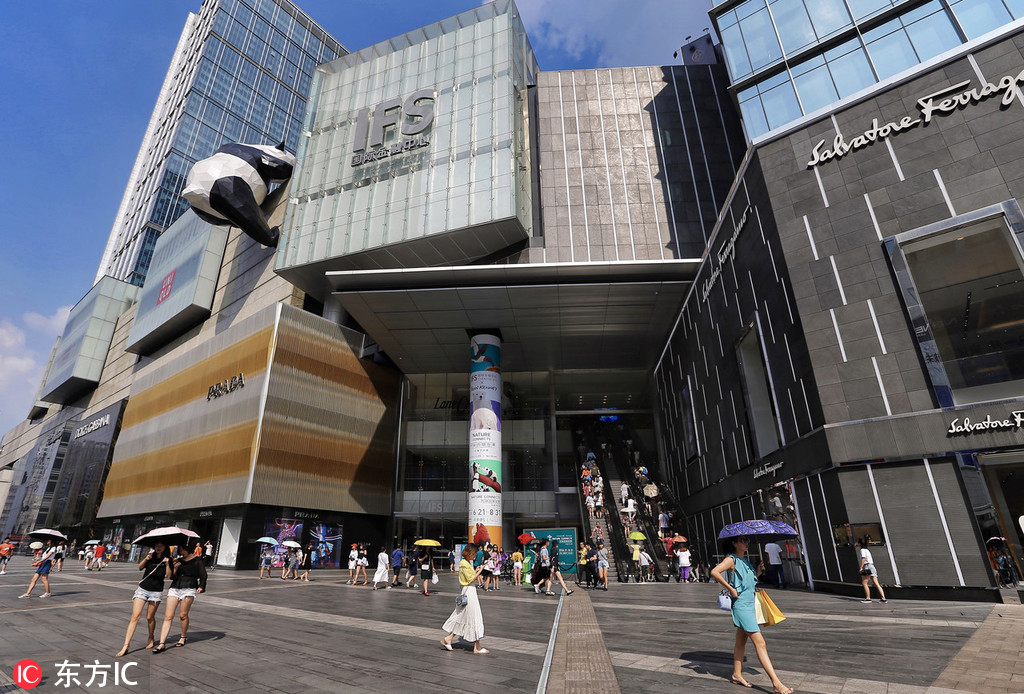Wharf ready to exploit consumption upgrade


Hong Kong's conglomerate The Wharf (Holdings) Ltd will seek to cash in on consumption upgrade and the rise of middle - and high-income earners on the Chinese mainland, one of its senior executives said.
Wharf is engaged in logistics, property investment, property development and hotel management.
Christina Hau, assistant director and general manager for retail leasing and operations of the company's mainland arm Wharf China Estates Ltd, said that economic restructuring can be seen in the rising contributions of services and consumption to GDP. Strong domestic consumption has strengthened China's markets but has also brought challenges to commercial real estate firms such as Wharf.
"Shopping malls in areas with abundant historical heritage have seen impressive growth in luxury brands, but also face the challenge of having to upgrade their facilities and services frequently," she said.
Hau made the remarks after the government announced it will take a series of steps to boost consumption upgrade nationwide and lowered import tariffs on a large number of import items such as clothing, automobiles and appliances last year.
According to the Ministry of Commerce, a number of measures were piloted in 11 pedestrian zones across the country in 2018, including Chengdu's Chunxi Road, Beijing's Wangfujing Street and Shanghai's Nanjing Road. Annual passenger volume in these renewed pedestrian zones is estimated to exceed 1 billion.
Wharf, using its practical experience and business model of Harbour City in Hong Kong, has made Chengdu International Finance Square, or Chengdu IFS, a new landmark on Chunxi Road.
The group currently is developing more IFS projects in Chongqing, Changsha, Suzhou and Wuxi.
Under its plan, the group will keep introducing more global brands, fashion products by young talented designers, artworks, digital technologies and environmentally friendly service facilities on the Chinese mainland.
Having invested 17 billion yuan ($2.54 billion) in Chengdu IFS, the group will continue to install artworks from France, the United States and other countries to further promote its brand awareness in western China, and seize more market share from the younger players, Hau said.
The availability of international luxury brands had surged in Chengdu because of huge demand from the city's shoppers. Chengdu IFS saw double-digit growth in retail sales in 2018, she said at the fifth anniversary event of Chengdu IFS in January.
Given consumers' penchant for leisure and global brands, the group is particularly keen to offer retail therapy solutions and novel experiences. People in Chengdu like chatting and having hotpot, but now fashion is becoming an important part of their lifestyle, said Hau.
"Chinese consumers, especially those born in the 1980s and 1990s, love living a quality life ... they like traveling, caring about their individuality, and have different pursuits to match their lifestyle. To woo them, we have brought iconic fashion such as denim, street styles and premium sporty brands to them," she said.
Growing number of international premium brands not only offered Chengdu residents the chance to keep pace with overseas trends, but also improved the city's ability to attract more tourists, business opportunities and investment, she said.
Wharf will continue to focus its resources and expertise on developing prime real estate projects on the Chinese mainland spanning a dozen cities, after it has established a reputation as the developer of premier landmark projects such as IFS projects and Times Square projects in Chengdu, Chongqing, Dalian, and Shanghai.
Guo Xin, a marketing professor at Beijing Technology and Business University, said that in addition to middle-income earners, China's millennials will have more purchasing power because many of their parents not only own an apartment but are not weighed down excessively by accommodation or mortgage concerns.
"Therefore, many of them in big cities are also looking for stylists to provide personal and professional fashion advice to help them better define themselves," Guo said.
China's consumption has continued its rapid ascent, and would remain the main driver of economic growth, the Ministry of Commerce announced in January.
The ministry estimated that the country's retail sales would climb 9 percent year-on-year in 2019, contributing some 65 percent to overall economic expansion.




































